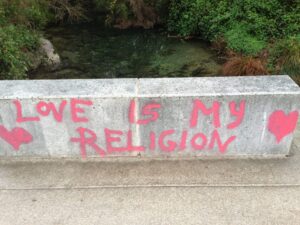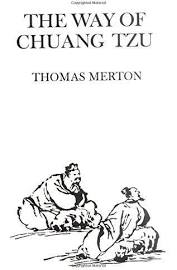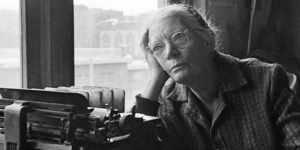A few years ago, my wife and I spent a week hiking on the North Rim of the Grand Canyon, returning to a comfortable room at the lodge each night for what I fondly call “roughing it.” As we set out on our day hikes, we’d often see kids messing around at the edge of the Canyon where it would be easy to slip, fall, and die. If their parents were watching, they weren’t saying anything, and the kids responded to our warnings with the gimlet eye.
When we met a park ranger on the trail, I told him I was baffled by this parental neglect. He shook his head and said:
I’m not sure it’s outright neglect. A surprising number of folks think of the Canyon as a theme park, a fantasy land that may look dangerous but isn’t, where hidden nets will save you from injury or death. Every day I have to remind some people that the Canyon is real, and so are the consequences of a fall of hundreds of feet. I guess some people prefer illusions to reality — even though illusions can kill you.
The ranger named a problem larger and more pervasive than the fantasy that the Grand Canyon is Arizona’s Disneyland. We Americans prefer illusions to realityat every level of our common life, even though illusions can kill us. Why? Because indulging our illusions comforts us — especially when they’re supported by a culture that loves to play “let’s pretend.”
That culture goes back at least as far as 1776 when America proclaimed the “self-evident” truth that all people are created equal — then proceeded to disenfranchise women, commit genocide against Native Americans, and build an economy on the backs of enslaved human beings. Today, our culture of illusions threatens to take us over the edge, not only on basic issues of justice but in critical sectors of our society like education, religion, and politics.
Let’s start with education. Educating a child is a challenging job, especially when we get real about the world in which kids live. It’s a world where nearly one fourth of our children live in food-insufficient homes and come to school too hungry to learn; where public schools are starved for resources as the push to privatize K-12 education continues apace; where many kids need help with heartbreaking personal problems while schools can’t afford to hire counselors.
Truly educating a child would mean adapting to the circumstances of the children in our care, including such “extracurricular” services as providing morning nutrition for those who need it. We must teach core subjects, of course, and hold teachers accountable for results — but we also need to teach life skills like emotional intelligence, relational trust, and problem-solving. Put it all together, and truly educating a child is complex and costly, though not nearly as costly as failing to do so.
Confronted with hard realities, we’ve given up on educating children. Instead, we’ve become obsessed with non-stop high-stakes testing, driven by the illusion that passing standardized exams equals getting an education. One way or another, the test scores must go up — even if that means “teaching to the test,” or getting rid of “irrelevant” subjects like music and art that aren’t easily tested, or telling adults to alter kids’ answers if they are wrong.
Surely most of us know that being able to pass tests is a far cry from being educated. But in the face of education’s real challenges, we are too comforted by our illusions to mind the difference. In fact, we double down on our illusions by passing legislation (e.g., “No Child Left Behind” and “Race to the Top”) that multiplies the damage done to our kids, their teachers, and our schools.
Who’s the “we” behind all this? You and I and all who make up “We the People” — we who have allowed our legislators to give the “testing illusion” the power of law and have voted down the tax hikes that real education requires.
The world of organized religion is another place where we often favor illusion over reality. No, I’m not about to argue that faith is fantasy. As a person of faith, I believe we have two eyes: the eye of the mind and the eye of the heart. With one we see the empirical world as known to science and reason. With the other we see invisible realities as known in the great spiritual traditions, including secular humanism. Only when our eyes work together can we see life steadily and see it whole, or so I believe.
The problem is that too many lay people in the Christian churches — the only form of organized religion I know personally, as an insider — have embraced the illusion that we can avoid spiritual challenges by hiring clerical proxies. As long as we’re in the pews on Sunday and there’s a clergyperson up front reading the Scriptures and preaching the Word, we can pretend we’re making a personal spiritual journey. In truth, we’re on a bus touring the Holy Land, while an ordained driver speaks into a mic, telling us what we’re seeing and what it means.
The sadness is that “real church” — where lay people as well as clergy do inner spiritual work — can make a difference in the real world. Need evidence? See the Civil Rights Movement, where the “habits of the heart” nurtured in the black church by generations of African Americans flowered in the nonviolent movement that advanced racial justice in the 1950s and 1960s.
Today, there are many clergy who want the church to reclaim that kind of reality. They work hard to encourage the ministry of the laity in places like the family, the workplace, and civil society, and to transform passive parishioners into active communities of support for such ministries.
But woe be to the clergyperson who pursues that vision too vigorously. More than a few have been pushed out by lay people who insist on having paid professional who will “do their religion” for them. The notion that a person can have a spiritual life by proxy is as illusory as the notion that good test scores equal being educated. This kind of religious unreality is one of the reasons many have left the church in search of spiritual nourishment: illusions are thin soup.
Then there’s politics, a field so rife with illusions it’s hard to know where to begin. But there’s one persistent American illusion that leaps out at me: “exceptionalism,” the claim that “the United States is the greatest nation on earth.” That’s a claim that frequently takes us beyond the virtue of national pride and into the sin of national arrogance.
What makes that claim illusory is, of course, the facts. On global rankings of many serious social ills, the U.S. scores poorly compared to other countries — but how many of us accept that simple reality? I’m talking about things like mass shootings and other gun deaths, numbers and percentages of incarcerated citizens, infant mortality rates, and child poverty and all that goes with it. Then there’s the fact that the evil practice of enslaving human beings is still with us in disguise, as Michelle Alexander has persuasively argued in The New Jim Crow.
If America’s founders were to come back to check things out — having had a lot of time to contemplate and do penance for their own mortal sins — I don’t believe they’d buy the idea that our task in 2016 is to make America great again. After Googling “Trail of Tears,” “Civil War,” “the Great Depression,” “Japanese internment camps,” and “Vietnam,” to name just a few, they’d ask us to choose a period in U.S. history of which it could truly be said, “Back then, we were great!”
Next, the founders would remind us that, as early as 1787, they knew that the truly great American task would never be to reclaim a mythical utopian era. Instead, it would be to work forever on forging “a more perfect Union” — and the founders gave us a suite of political institutions brilliantly designed to do exactly that. It’s not their fault that “We the People” have allowed our leaders to lay waste to those institutions in recent years.
I believe that most Americans want to take on the real problems bedeviling this country. Doing so demands that we dismantle the culture of illusions that blinds us to reality. Culture change is neither quick nor easy — it will take a long time to find our way through the smoke and mirrors. But all long journeys begin with one small step, so here’s a modest proposal: let’s reclaim “disillusionment” as a word that names a blessing rather than a curse.
When a friend says, “I’m so disillusioned!” about this or that, why do we say, “I’m so sorry! How can I help?” We ought to say, “Congratulations! You’ve just lost an illusion! That means you’ve moved that much closer to reality, the only place where it’s safe to stand!”
Right now we’re hip-deep in an election year that offers us a rare opportunity to become seriously disillusioned and more grounded in reality — not only about the state of the nation but of education and religion as well. When fact vs. fiction becomes a non-issue in politics, might it be because in school millions of us were taught to pass tests, but not to challenge claims, ask questions, do research, and think for ourselves? When millions of us find racism, bigotry, sexism, and xenophobia no barrier to high office, might it be because in church we let someone else “do religion” for us, allowing our unexamined inner lives to be polluted by a toxic fear of “otherness?”
As we lose our illusions, we’ll see reality more clearly and develop better solutions to our most pressing problems. As we embrace the fact that we don’t live in a theme park but on the rim of the Grand Canyon, we’ll understand the urgent need to walk ourselves and our kids back from the edge of the abyss onto solid ground.




